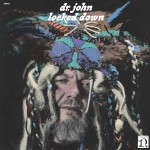Dr. John’s Gumbo is one of the great New Orleans albums, but it made Dr. John subtly smaller. It made New Orleans central to his public persona as he became the man who synthesized, translated and embodied New Orleans for the rest of America. When he released City That Care Forgot in 2008, he railed against corrupt power as a citizen of New Orleans and America. When he released Babylon in 1971, he spoke to power as a citizen of this world, the hipster world, the next world, the spirit world, the freak world and worlds yet to be named. New Orleans clearly shaped the idea of Dr. John as we first heard it, but his musical and lyrical reach drew from points well beyond the Orleans Parish boundaries. On Locked Down, Dr. John—Mac Rebennack—works with producer Dan Auerbach of the Black Keys to restore the mythical and mystical elements of Dr. John, and they succeed brilliantly.
At Auerbach’s suggestion, there’s little if any piano on the album. Instead, Dr. John plays the Hammond B3, the Fender Rhodes, a Farfisa (for the first time since he played one on a Doug Sahm session in 1968, according to press notes) and other lesser-known keyboards. That decision replaces the hard, grounding percussiveness of a piano with psychedelic textures on an album that’s rich with texture—particularly baritone sax, a lot of well-placed baritone sax. Auerbach plays guitar throughout, often with richly distorted tones, though on “Ice Age” he adopts a brittle, wiry sound that plays up the highlife nature of his part.
When recording the album, Auerbach saved the vocals for last, and though Rebennack initially balked at the suggestion, the results are just short of a revelation. Thirty years roll off his voice on Locked Down as he sings with an animation, clarity and conceptual richness that we haven’t heard in a long time. When he testifies during “God’s Sure Good,” you believe him, and he sounds as comfortable conjuring in “Eleggua” as he does running a line of jive on “Kingdom of Izzness.” He embodies the “Big Shot” and whispers with compassion, “I love y’all / ain’t nothing you can do about it” to open “My Children, My Angels.”
Those moments of softness are important because they make the more political songs on Locked Down that much more dramatic. At 70, he should be in his Matlock Years and enjoying the grandkids, but instead he’s calling for revolution. “This ain’t no Age of Innocence…KKK and the CIA / all playing in the same game,” he declares in “Ice Age.” His isn’t a wonky analysis, though. He’s not political by default; he’s been pushed to a radical response by the state of the world.
Musically, Locked Down’s subtly political in the same way that Dr. John’s early albums were. Lyrically, he may be warning people like an Old Testament prophet, but his music here embodies the values of the world he hopes for. It’s open-minded, adventurous, expansive and accommodating. There’s wit and warmth, and it’s as much for the body as for the mind. Dr. John and Dan Auerbach didn’t enter a time tunnel backwards to produce Locked Down; they remembered what was great about the early albums and brought it to 2012.




